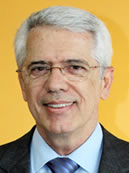 |
Fernando Rizzo, received his B.S. in Metallurgical Engineering from the Catholic University of Rio de Janeiro (PUC-Rio) in 1970, M.S. in Materials Science from the Military Institute of Engineering (IME) in 1973 and Ph.D. in Materials Science from the University of Florida (1978). He was a Fulbright Visiting Scholar at the University of California - Los Angeles (1986-1987), and Visiting Professor at the Institute of Materials Research of the University of Leeds (2004-2005) and the Bundesanstalt für Materialforschung und-prüfung (BAM), Berlim (2014-2015). Fernando is Professor of the Department of Chemical and Materials Engineering at PUC-Rio. His field of interest is centered on Phase Transformation of Materials, covering topics on High Temperature Corrosion, Computational Thermodynamics, Synthesis of Nanostructured Materials, Ceramic Superconductors, Materials with Negative Thermal Expansion, and Processing of Steels by Quenching and Partitioning. He has published over 100 papers in peer-reviewed journals and supervised more than 40 Masters and PhDs students. He holds the CNPq’s - 1A ranking for productivity in research and is recipient of Scientist Grant from FAPERJ (Rio de Janeiro State Research Foundation). Fernando was Chairman of the Department of Materials Science and Engineering (1979-1983) and Dean of the Science and Technology Center (1983-1986) at PUC-Rio. He is Associate Editor of the journal Materials Research and was President (1993) of the Brazilian Association for Metals, Minerals and Materials (ABM). He is a Fellow of ASM International and received the Brazilian National Order of Scientific Merit. He is a member of the Brazilian Academy of Sciences, of the Pan American Academy of Engineering and of the National Academy of Engineering. From 2006 to 2014 he was Director of the Center for Management and Strategic Studies (CGEE) and since 2015, he is the Director of the National Institute of Technology (INT). |
Fernando Rizzo
PUC-Rio/INT
Abstract
The field of Materials Science and Engineering (MSE), which originated in the late 50’s during the space race, has since undergone continuous renovation, with the introduction of new tools and theoretical concepts at a steady and growing rate. Due to its multidisciplinary character, the development of Materials Science and Engineering accelerated further with the inclusion of new topics from related areas, expanding progressively the scope of the field and increasing the depth and complexity of treatment of any research area. During the last decades, the development of new materials has been influenced by marked evolution in IT technologies, which resulted in substantial improvements in the areas of characterization and modeling, enabling the emergence of comprehensive new approaches, such as the Materials Genome Initiative (MGI), the Integrated Computational Materials Engineering (ICME), and Multiscale Modeling in Materials Processing. The ability to operate in different length scales and bridging the gap between them has been successfully demonstrated in such a manner that modeling can start at the electronic scale, with density functional theory (DFT) and move accoss the nano, micro and macro scales to reach the structural scale with finite element methods (FEM). Following this advancement, a sequence of modeling techniques, such as Monte Carlo simulation, molecular dynamics, phase field models and computational thermodynamics (CALPHAD) can be employed. Characterization techniques, such as electron microscopy and x-ray tomography have also progressed considerably, extending thereby observation capabilities and permitting experimental verification of models, in situ observation of fast transitions as well as 3D visualization of parts. Processing is the most recent area to undergo a disruptive transformation, with the advent of Additive Manufacturing, which will certainly revolutionize the materials production and commercialization sectors. This talk will discuss examples of state of the art research in the MSE field, highlighing the new trends in materials development.